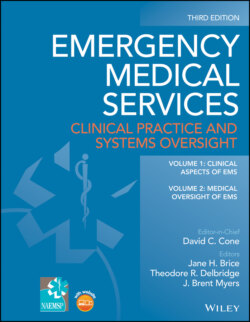Читать книгу Emergency Medical Services - Группа авторов - Страница 230
Aspirin
ОглавлениеAspirin is inexpensive, readily available, and has been shown to benefit patients having myocardial infarction or other ACS. The ISIS‐2 study established that the absolute benefit of aspirin administration for myocardial infarction patients results in 26 fewer deaths per 1,000 patients treated, with the maximal benefit occurring in the first 4 hours [29]. Prehospital administration of aspirin is safe, may improve outcome, and should be given as soon as possible to patients with suspected ACS unless contraindicated [15, 16, 30–32].
A sex difference has been documented in aspirin administration in the prehospital management of patients presenting with chest pain. Analysis of data in the National EMS Information System for about 2.4 million prehospital patients evaluated for chest pain showed that, for every 100 EMS chest pain calls, 2.8 fewer women received prehospital aspirin than did men [33].
Despite strong evidence of the benefit of aspirin in the treatment of chest pain, in a similar study of 198,232 patients eligible to receive aspirin by protocol, only 45.5% actually did. This highlights the importance of EMS systems to focus training on reinforcing aspirin administration to eligible patients and monitoring aspirin administration through established quality assurance programs [34].
Varying doses of aspirin have been proposed, but for ACS the most widely used dose is four 81‐mg baby aspirin tablets. These tablets are well tolerated, easy to swallow, and more rapidly absorbed than other preparations. Rectal preparations (300 mg) should be considered in patients unable to swallow. Acceptable contraindications to aspirin administration include definitive aspirin allergy or a history of active gastrointestinal bleeding.
